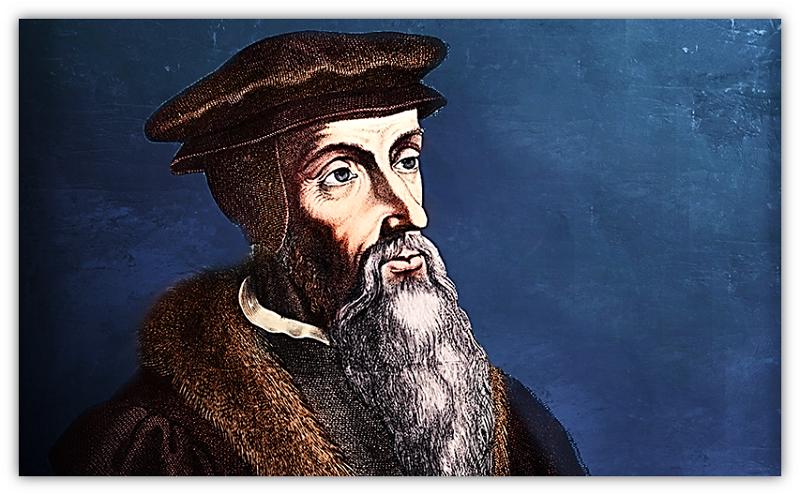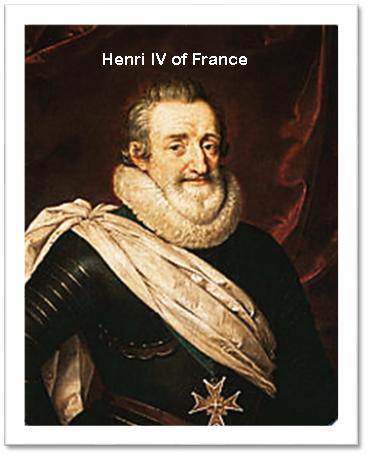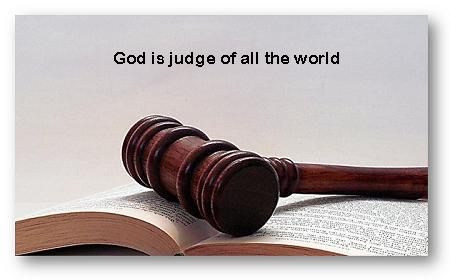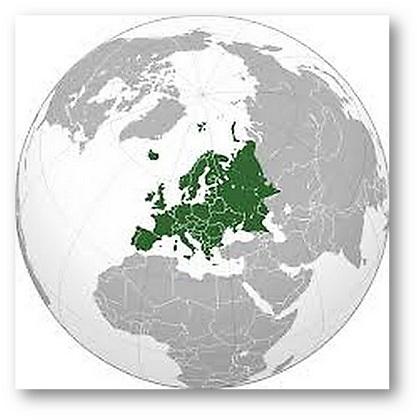Calvin Addressing Europe
Calvin Addressing Europe

Summary: John Calvin’s vision was and remained, not to create a network of local Reformed Churches, but to see the national Catholic Church (of France) reformed. He thus looked to the nations in Europe with each its specific government, and called on the respective heads of state to address their responsibility toward God as shepherds of their peoples. His exposition (sermons) of Scripture and the structure of his prayers attest to this. The dedication of biblical commentaries and diplomatic engagement gave substance to this vision. How should Calvinists apply this vision to the (economical unity of) Europe of the 21st century and its diversity of peoples?
The title ‘Calvin addressing Europe’ was formulated, of course, with ‘Europe’ as the present union of states in mind.
- How does our present day Europe compare to the Europe of Calvin’s times?
- And what can Reformed Churches today learn from the vision and mission of this great forerunner on the eve of the celebration of the 500th anniversary of his birth?
The 16th century knew no ‘European Union’ consisting of democratic governed states. The following constellations of states existed:
- The Habsburg (German-Austrian) empire with their many minor principalities (duchies, counties, earldoms, etc)
- the Spanish kingdom of Charles V and Philip II
- France and its proud royal line, and
- the England of king Henry 8th, young Edward VI, and the competing queens Mary and Elisabeth.
Whereas religion divided the Europe of the 16th century, precisely because of the Reformation, the European Union of our days is united in the separation of state and church (initiated by the Revolution of France) of the participating countries.
I hope to take you historically through some data of John Calvin’s life and work vis-à-vis the Europe of his days. In the process I intend theologically to find some lines that could help Reformed Churches today to testify to the Gospel of God and his Christ in Europe.
1. Dedications to Heads of State in Europe⤒🔗
Was John Calvin, living in the free and more or less democratically governed city of Geneva, aware of the political situation of the surrounding states? He was, as is attested by his correspondence. Today, however, I would like to point especially to those public letters which introduced his compendium of doctrine and biblical commentaries to heads of state in Europe.
- His first theological book, the Institutes, had in 1536 a prefatory address, a public letter to king Francis I, ‘the most Christian king of France’. This monarch, however, gave in to persecution of his ‘evangelical’ subjects. The young scholar Jean Calvin pleaded their cause and presented their teaching. This public letter remained in place and in print, even when the king had already died and was succeeded by Henri II and the sons of Catharina de Medici.
- King Francis I died in 1548. The political landscape then changed. That very same year Calvin began to dedicate also his biblical commentaries to (or tried to gain acceptance of dedication from) kings and princes in the rest of Europe. That is when they seemed inclined towards reformation and willing to be addressed as such in a public letter. He was aware that Europe was larger than France. Calvin dedicated volumes
- to the duke of Württemberg, Frederic III the Elector of the Pfalz (1563), and the sons of the duke of Saxony
- to the Lord Protector of England, to king Edward VI, and to queen Elisabeth,
- to the kings of Poland (Sigismund-Augustus), Denmark and Sweden (Gustav I, in 1559), also to prince Radziwill of Poland and Lithuania, and
- to the future Henri IV of France (1563). And also to the Council of the cities Geneva and Frankfort.

Such a dedication must be accepted by the monarch in advance (and there were refusals). It is therefore clear that Calvin could only address rulers who were known to be sympathetic to the Reformation of the Church in their territories. He then exhorted them to persevere in their faith and be true kings and queens.
I give you one quote (from the dedication to queen Elisabeth of England, who succeeded her sister, ‘bloody’ Mary). God promised through Isaiah: ‘Kings will be your foster fathers, and their queens your nursing mothers’ (Is. 49:23). Calvin turns this verse to Elisabeth of England: be a nursing mother to my people! ‘This duty you ought to discharge (...) by cherishing the flock which not long ago lay trembling and concealed, but by gathering the exiles...’
Calvin wrote to rulers in France and England, the German lands, Eastern Europe, the Baltics and Scandinavia, positioning himself as a spider (not in a www-dot way but) in a Europe wide web. These dedications were a window of opportunity, born from the network of correspondence between the leaders of the Reformation in the various countries. The message was: reformation of the church is in God’s honour, for the good of the nation, and therefore includes the ruler as appointed by God.
2. Prophecy against or addressed to the Nations←⤒🔗
The Old Testament contains many so-called ‘prophecies against the nations’. Preachers today may tend to overlook these, but the Genevan preachers could not do so in the lection continua (ongoing reading of and preaching on biblical books in the sequence of chapters). I pose this question: what do such prophecies tells us about Calvin’s view of the nations that do not know the God of Israel and his Christ.
The second volume of surviving sermons on Ezekiel contains a body of sermons on Ch. 25-32. On the prophecy against Amon Calvin observed: God’s judgement on Israel has fully been preached until Ezek. 24.
Now he prophecies against the foreign nations. Not that he (Ezekiel) has been ordered to be their teacher (docteur). But it is in order for us to realize that God is judge of all the world en not only of the Jews.
Mostly Israel is addressed. The book Ezekiel has shown thus far that God begins the execution of his judgement ‘not with unbelievers, but with his own house and his Church’. But after God has finished all his work against Mount Sion, (Is. 12:10) he now turns against the heathens, against those who have no relation (accointance) with him. Though God has spared them for such a long time, they too will have their turn.

But why, could God’s chosen people ask, do we deserve to be punished more than the others? ‘Because we have offended our God after he has proven his kindness and made clear to us that he has chosen and preferred us above all others’. Calvin preaches on a prophecy against the nations, and still he devotes most of his time to explaining why Israel and the Church are chastised. At last he announces: let us see what the difference is between the preceding prophecies and those until Chapter 32. The prophets speak against Israel’s neighbours: Amon, Moab, Idumea, Tyre and Sidon, and after that Egypt, Assyria and Chaldea. Again Calvin stressed:
The prophet turns (se addresse) to these peoples, not so that he would be appointed to them as teacher (docteur), as we have already said, but to instruct them for their good (pour leur salut). For his commission did not reach beyond the borders of Judea.
Here Calvin is not sufficiently lucid: is there a message for the nations surrounding Israel, or not?
He continues to describe the purpose of these prophecies: ‘This is in order that there would be some who are preserved as a seed, so that the Church of God would not completely perish, and that these men would be comforted when they hear that God punishes his people in such a way that he does not forget the promise, made to Abraham, ratified to the other patriarchs, and finally (put) into the hands of David.’
The aim of these prophecies was not to bring the nations to repentance, but to console the remaining seed of Israel.‘It may very well seem that everything is perishing, but God will protect you against your enemies and he will even punish the Amonites and Moabites’. The style of the prophet is deliberate: the form of an address to the nations is more powerful than an account in the third person. Therefore God says: ‘Son of man, turn your face towards the people of Ammon’.
I myself have given some thought to the expository question: is it possible that the prophets who spoke against the nations, also had to deliver their message in the foreign countries? Think here of Jonah, who was directed to go to Nineveh. I have never read anything in this vein on the many prophecies against the nations. But Calvin was not finished yet. He concedes:
There could, however, be a few who, as by accident, have received this prophecy and have believed the prophets. If there were some from among the Amonites and Moabites whom God wanted to call in an extraordinary way (extra-ordinairement), they have benefited from this. And following affliction, they will have had the opportunity to think more of God, whom they had despised before.
Having conceded the possibility of a special calling of some heathens, Calvin underlines that such was beyond the ordinary. For the real commission of the prophet was to instruct the Jews.
What is the message of such prophecies according to John Calvin? When we see upheaval in some country, we should never attribute it to fortune, but to God’s judgement. This is the portrait of God as painted in sermons on the prophecies against Israel and against the nations: God, Father of mankind and especially of his people, is Judge. He who bows before this just Judge, will find Him to be a kind Father. The Reformed Churches today have to ask themselves: how do we communicate the Gospel of God’s grace in Christ against the background of his abhorrence of and wrath against national and private sins? If the argument holds water that the prophecies against the nations were not delivered abroad, it cannot be used as an excuse for ignorance after Pentecost.
It has been argued that Calvin had no eye for what is referred to in The Netherlands as the apostolate of the Church, the Church’s calling to missionary activity. It is true that he saw the office of apostle as unique, instituted directly by Jesus Christ and fulfilled in their testimony and in the New Testament. Moreover, in medieval times the legend of the divisio apostolorum held sway. According to this idea the twelve apostles had divided the nations among themselves and brought the Gospel to that part of the world, assigned to each. Thus the whole world had heard the Gospel of Christ in one generation, in the very first century. This does, however, not imply that the Reformers had no vision for the mission to the nations. Dr. McKay has already spoken to you on this aspect.

3. Calvin’s Vision and Mission: Church and State←⤒🔗
Looking back it may seem as if Calvin inaugurated the Reformed Churches as a confessional denomination, at least over against the Roman Catholic Church. But he kept his vision of true reformation with respect to his homeland, of the national Church of France, the Gallican Church. That was the aim of the mission of Geneva in sending ministers to France from the mid-fifteen-fifties and in the fifteen-sixties. Even when the Reformed churches met in Paris in their first national synod, Calvin objected to an all-too-public manifestation and to the publication of an all-too-independent confession. He was afraid the royal court might be irritated in the already unstable situation after the sudden death of Henri II, in 1559. The effect would be negative for the reformation of the Gallican Church.
One may wonder whether all this is quite irrelevant to today, since Calvin, with all his vision, was still enclosed in the corpus christianum. Whether Roman Catholic or Reformed by persuasion, were not all states in Europe more or less a Christian world, while we not only as Calvinists live in a non-Calvinist society, but even as Christians live in a non-Christian society?
My question would be: what was exactly a corpus christianum? Was it the nation, society, or the Church? Does it imply that all nations and their citizens were regarded as being ‘Christian’? No, even the Church was perceived as a corpus permixtum. How much more so society. Conversion of the individual and reformation of the Church was necessary. When the Church refused to be reformed, she ultimately ceases to be Church of Christ.
But was not the epitaph ‘Christian’ the highest common denominator? Well, let us look at some of Calvin’s descriptions of various European nations. These come from a booklet on a story of ‘human interest’ that made the headlines all over Europe. In the sixteenth and seventeenth century the dramatic history of Francesco Spiera was told and retold in a number of testimonies, organized in various forms and translated into various European languages. This Italian man was an adherent to the beliefs of the Reformation, but was forced to recant. He then fell ill and died in despair, certain of having lost his salvation. John Calvin was asked to compose a preface to the Genevan edition of this booklet. This preface testifies how aware Calvin was of the ramifications of stories of martyrdom, or of apostasy. His preface contains a description of how he saw the nations – that is not as Christian nations. First he addresses the Italians, ‘because by a remarkable providence of God this terrible theatre came much closer to their eyes than to others. They cannot be woken up when they do not see these tragic (e)motions’ (CO 9, 856).
Calvin goes on to address the stand of the other nations (November 15, 1549).
Meanwhile, let the other nations know that God addresses them also by this warning. Let our French (people), by their levity reaching for the skies, pay attention – who are, more than is justified, used to profane mockery of religion. Let the Germans take note, who formerly were very sluggish and stupid in paying attention to God’s judgements, but now in these extreme evils seem to have lost all human feeling. Let also the English and the others (we might say: Americans) learn how with much esteem and how carefully they ought to receive Christ who is beginning to shine on them.CO 9, 857
Thus Calvin expressed what he thought in general of various countries. Fortunately he had no negative impression of the people of the Low Countries. Well, his mother was from Cambrai in the Southern Netherlands. Calvin once wrote: Sum enim Belga ipse quoque (‘For I am myself also Belgian’), which I like to read as Dutch.
In the case of England, the ascension of young Edward VI was the only hopeful sign. God’s judgements, such as seen in Spiera’s death, are an instrument of divine providence by which he speaks to the world. As the prophet Isaiah said: ‘When your judgements come upon the earth, the people of the world learn righteousness’ (Is. 26:9). So much for those Christian nations of the 16th century!
4. Prayers Reflecting the Core Business←⤒🔗
According to Genevan liturgy John Calvin led the congregation in prayer, following the sermon. It was a formulary prayer – for Sunday services the text was prescribed in La forme des prieres et chantz ecclesiastiques (1543), for weekday services the minister could make ‘such an exhortation to prayer as he deems right, adapting it to the time of and the matter treated in his sermon.’

I took one example of such a modified prayer from the body of sermons on Ezekiel (no. 53), of which I had the honour of editing one volume. I take the missionary notions from prayers like these. What strikes me in the line, following the first (adaptable) part, which always introduces the closing prayer: ‘(We pray) that You do not only grant such grace to us, but also to all the peoples and nations of the earth...’ The congregation, gathered on Sundays and weekdays in God’s sight, has her eyes on the whole wide world around.
The word ‘etc.’ refers to the formula text as used by Calvin (but not found in the Church order of Geneva).
I translate: ‘(We pray) that You do not only grant such grace to us, but also to all the peoples and nations of the earth, leading all poor untaught people from the captivity of error and darkness to the straight path of salvation. And to achieve this, (we pray) that it would please Him to arouse true and faithful ministers of the Word who do not look for their own gain and ambition, but to the credit of his holy name only and to welfare of the flock.’
A little further in this rather long prayer Calvin, the minister, follows the Pauline exhortation of 1 Timothy 2:
‘(We pray our good Lord) that he by his holy Spirit may guide all kings, princes and superiors, who are the government of his sword, so that their dominion will not be on greed, cruelty and tyranny (...) but in all justice and righteousness. And that also we, as living under their rule, render them honour and obedience as is their due, and that by means of a right peace and quiet we may serve God in all sanctity and honesty’.
Then follows a prayer for all who suffer ‘of various forms of the cross and tribulation: the people who are scourged by the plague, war or famine or his other rods; persons struck by poverty, imprisonment, illness, banishment, or other adversity of the body or affliction of spirit.’
Then follows a prayer especially for the faithful ‘dispersed in that Babylonian captivity by the tyranny of the antichrist’, leading to the Lord’s Prayer.
Calvin thus used to pray – every weekday in the morning – for the nations, for their rulers, for the afflicted people. What strikes me too are the titles he chose for Jesus Christ. These are metaphors from daily life. He can call Him ‘principal Pastor and Prince of bishops’. But also (and I would like to point your attention to these titles): Christ, our Lord, is also ‘our Captain and Protector’ and at the same time God’s ‘lieutenant’. These titles are not found in Scripture but taken from the 16th century. They are designed to drive the message of the Gospel home.
- Captain is the leader of an army. The one whom the soldiers, rally to and seek victory for. He is also the protector of the people.
- Lieutenant is to be taken literally: ‘lieu tenant’, he who was commissioned to take or hold the place, to govern the city. Christ is God’s right hand on earth.
Maybe we should think of names or titles in society today that provide a striking comparison for the essential work of Jesus Christ. For example, is He not our President, elected by God, accepting the nomination, on behalf of the people, sworn in by the Spirit?!

Add new comment